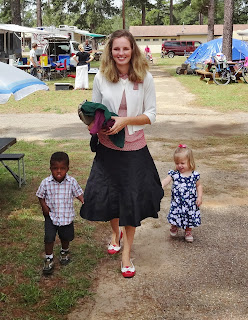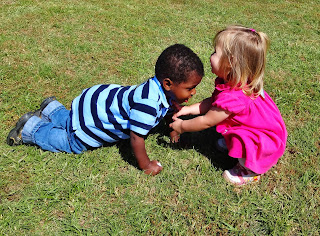When I started this journey into parenting I remember distinctly thinking that since I was being licensed to foster older children (up to 12 years old) there was no way I would get placed with infants or toddlers, plus everyone else wanted the younger ones. And that was perfect! Babies were too needy. Two year olds scared me. I wanted already potty-trained. But then came not one, but TWO needy infants, soon to be two scary, potty-training two-year-olds.
"NOOOOOOO!!!! NOT 2 TWO-YEAR OLDS!!!
I do believe God blessed me with the exact children He wanted me to have. The exact children to establish, stretch and grow my love, joy, peace, patience, kindness gentleness and self-control. He didn't give me perfect, regenerate, naturally-obedient children. He gave me little sinners always in need of gentle correction or training and loving patience ("definition of patience: the capacity to accept or tolerate delay, trouble, or suffering without getting angry or upset."). I always have to remind myself that it is only in the trials that I can practice patience (it does NOT come naturally), and oh boy, do they give me plenty of opportunity to practice!
I have realized that this parenting journey is primarily God working on ME! NOT God using me to work on my kids. Although He does use us parents, if I am worried only about letting God transform MY HEART more and more into the likeness of Christ then reaching my children's hearts comes naturally. If I am focused on obeying Jesus' commands in Scripture then teaching my children to obey comes naturally. If I am taking time daily to soak in the love and grace of Jesus then graciously loving my children flows naturally.
My two-year-olds are not terrible because of age, they are just little trouble-presenters to see if I am going to act terrible. They are my little patience-testers (again, patience is the capacity to accept or tolerate delay, trouble, or suffering without getting angry or upset).
And God gave me TWO two-year-olds (plus 3 big kids)! He must have known I had very little patience to start with and wanted to grow it real quick with so many little patience testers constantly presenting trials. Remember, the definition of patience requires us only to not get angry or upset during troubles or suffering but Jesus in the book of James steps that goal up when He says,
"My brethren, count it all joy when you fall into various trials, knowing that the testing of your faith produces patience. But let patience have its perfect work, that you may be perfect and complete, lacking nothing." James 1:2-4
My God wants me to be perfect and complete, lacking nothing! Doesn't that sound amazing!?! To be lacking nothing!?! To be perfect!?! But we have to count all our trials joy? And develop such a tremendous amount of patience to reach this goal? But my God, in His goodness, provided me a fast track to perfection. He provided me with two master patience-testers and five trial-presenters. All for me to have plenty of patience practice and much joy to count, so that one day I may be complete!
Trust Mommy, Trust Jesus
God is working on me ALL the time! Parenting is hard, but I have found out one thing, well-trained and trusting children produce much more joy in between the trials.Here are the 5 most important things we trained our little ones up with:
1. Sleep training or as I call the "anywhere nap": Our little ones, since 10 months old could be laid down anywhere during naptime to sleep. I would tell them their current behavior, whining, being easily irritated, or clumsiness leading to falling, were symptoms of them being tired and lay them down. Cranky babies are good tools for patience practice, I just kept laying them back down. I didn't have a sleep routine, no I must be rocked, no I must have at least 3 stories, no you must sing me songs until I drift off. Remember, I had instant chaos, five kids, all ages, at once. I couldn't be everywhere at once and when my little ones were tired, they were T I R E D and cranky! They needed the remedy for crankiness, but didn't know what it was. Trust mommy, sleep is the remedy. Maybe one day, if you can learn to trust mommy, you can trust Jesus.



2. Blanket training or as I call "sit, stay, play": With so much going on and homeschooling the big kids it was often necessary to know where the little ones were and what they were doing. They couldn't be trusted to play quietly alone in their room, they would un-doubtedly be shoving beads up their nose or "washing" their hair with the toilet brush. I would put them on a blanket (for visual boundaries) or just ask them to stay sitting and give them toys to play with. This requires lots of reminders and some patience practicing during rebellion when they want to get up. But loving, consistent boundaries that cannot be crossed or changed create a child willing to just play with toys. Trust mommy, it is safest for you to play here next to me with no worry of getting in harm's way. Maybe one day, if you can learn to trust mommy, you can trust Jesus.


3. Hold or stay training or as I say "hold mommy's skirt", "hold the car", "hold the wall". When we are walking and I need to know where two little bodies are but need one or both hands free to carry groceries or what not, I will ask the twins to "hold mommy's skirt. If we are in a parking lot loading or unloading the car I will ask them to "hold the car" while they are waiting so they don't play or wander in front of a car. If checking out at a store and I need my hands to count money or sign something I will ask them to "hold the wall" so I know where they are. Another time I use this one a lot is in the bathroom, when I don't want them making a game of crawling on the floor or licking potties, I will ask them to "hold the wall" at the stall door. Trust mommy, to keep you away from danger you need to stay where I ask you. Maybe one day, if you can learn to trust mommy, you can trust Jesus.


4. Be kind to others training, believe it or not, the golden rule is not innate. Hitting, biting, yelling or taking is not tolerated. Period. If it is over an object (which it mostly is) I will explain that your brother or sister you just hit, bit, or yelled at is much more important than this object. If you cannot value them I will not allow you to value this. They can then choose to apologize to the victim of their outburst and share the object or mommy keeps it. A sorry and a hug are modeled. These are definite patience practice moments as they often involve two or more heated, angry parties. Trust mommy, relationships will always be more important than stuff. Maybe one day, if you can learn to trust mommy, you can trust Jesus.


5. Be sweet training, this is when that bad attitude creeps up and bites them leaving them with a fowl mood that is a temper tantrum waiting to happen. If a pouty lip or furrowed brow appears I will explain what I see, what I think that means they are feeling, and maybe even the reason they are feeling that way, if I know. For example, "you have a pouty face, you must be upset, maybe it is because your sister has a toy you want? It is okay to be upset, why don't you go to your room until you are ready to be sweet?" or "you look angry because mommy said no. Mommy gets angry too, please go sit in that spot until you are ready to be sweet." My little ones have never had a knock down, drag out, on the floor temper tantrum because I stop them at the first symptom. As a mom I often have to excuse myself to pray or get my act together before I deal harshly with my children. Even at two they are able to exercise that same self-control, sometimes they are even better at it! Trust mommy, God doesn't want us led by our emotions and tempted to hurt others. Maybe one day, if you can learn to trust mommy, you can trust Jesus.


All Children, Good or Bad, are Trained
I am told all the time how well-behaved and sweet my kids are. I am always being asked how I do it and have even been accused of having "robotic children". I am just a new mom, only two in mom years, and often find myself crying over daily failures and praying for strength for another day's trials. I am definitely not perfect and do not always practice patience as I should. But my kids are definitely not forced robots, they sin often, but they are being trained during trials to exercise self-control and peace as much as I am practicing putting on joy and patience. We are, together, exercising our trust daily!God always knows what He is doing, when He gave me 3 older kids that were full of chaos, unruly, untrained, and habituated in sin He really showed me what the verse in proverbs means:
"Train up a child in the way he should go,This is not just a promise for the well-behaved child, this is a proverb, a statement that shows if you do or act this way then that way is the typical outcome. We were placed with 3 elementary age children that were trained up (all kids are trained whether you want to think yours are or not). They were trained in not being able to trust adults, especially parents, and to reject authority. They were trained to hit, bite, scream, pout, and rebel to get their way. They were trained to only obey if it was their idea to do it and they got a large reward. They were trained to lie, cheat, steal, manipulate, and blame to achieve their own selfish goals and desires. My older kids were habitually trained to get what they wanted first, to meet their own needs, regardless of any hurt caused around them and this was modeled also by the adults in their life. As proverbs points out once trained they are most likely not to stop that behavior into adulthood. Habits are hard to break! (Click here for previous post about my big kid's behavior struggles)
And when he is old he will not depart from it."
Proverbs 22:6
With lots of re-training needed, and still needed, I vowed to be proactive with my little ones. I wanted them to be habitually trained to think of others first, to seek after good instead of evil, to have confidence they can self-control their own bodies and to trust authority figures God has sovereignly placed in their life.

Again I am NOT perfect, but I trust Jesus and I want all my kids to one day, Lord-willing, also know that trust that lets us safely and comfortably live in the firm boundaries of our loving Father!
Posted by Shannon
Soli Deo gloria - Glory to God alone






